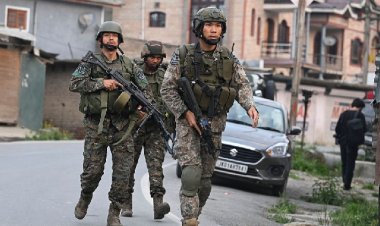This state made cannabis legal. So why is there still an illegal marijuana problem?
City and state officials report that over 1,300 illegal outlets have been closed down, but it is thought that thousands of others are still operating.

“It’s really disheartening to see people flying in the face of the law,” Soodak remarked in an interview. “People assume these unlicensed stores are mom-and-pop shops. … Most of these stores are owned by conglomerates.”
The legalization of marijuana in New York in 2021 sparked interest among cannabis companies, which view the state as a potentially lucrative market. Yet, more than three years later, only 182 licensed dispensaries exist in a state populated by 20 million people. In contrast, Michigan, with a population half that of New York's, boasts over 800 dispensaries.
Insufficient licensed dispensaries have led to a surge of unlicensed sellers, many of whom disregard regulations by opening near schools and selling cannabis in eye-catching packaging. In response, lawmakers provided state and local authorities with enhanced enforcement powers earlier this year to combat these illegal operations.
The crackdown is generating outcomes: The New York State Illicit Cannabis Enforcement Task Force has padlocked at least 345 locations statewide, while New York City authorities have closed around 1,000 establishments within the city. However, with roughly 4,000 unlicensed sellers estimated to have existed in New York City before the enforcement began, it’s likely that many more remain operational, and ongoing legal challenges could impact enforcement efforts.
One challenge facing enforcement agents is the need for thorough investigations into the ownership connections of unlicensed cannabis retailers, as explained by Dan Haughney, director of enforcement for the state’s Office of Cannabis Management.
“If we know that there’s an operator that has a store on one corner and another one three blocks away, we’ll try to hit those stores that are connected at the same time,” Haughney said during an interview in August while his team was inspecting stores in Queens.
Furthermore, illicit sellers are adapting their strategies. Some are changing their operating hours, often only opening in the evenings, prompting state investigators to adjust their schedules accordingly. Many unlicensed storefronts are also minimizing on-site inventory to evade potential seizures during inspections.
According to Haughney, the majority of inspected unlicensed cannabis sellers are also engaged in some form of processing on-site, which includes activities such as creating cannabis pre-rolls or manufacturing infused edibles. Such practices are prohibited for licensed cannabis dispensaries in New York.
Haughney expressed concern about the conditions under which many of these products are made, describing them as “unsanitary and disgusting.” Additionally, he raised alarms about the colorful packaging of some illicit products aimed at children, often featuring bright colors, bubble fonts, and cartoon characters.
“When they have the cartoon characters on there, that would entice a kid to grab it,” Haughney stated. “When I see this stuff … we’re going to do everything we can to padlock.”
His team has also observed cannabis products branded as Stiizy and Jeeter that appear to have been diverted from California's regulated market. Stiizy executives have indicated that these items are actually illicit cannabis packaged deceptively. However, Haughney believes some of the Stiizy products he encounters are indeed obtained from the legal California market through collaboration with enforcement counterparts on the West Coast.
Stiizy, along with other California brands, is currently facing multiple lawsuits regarding their alleged involvement in the illicit market both in California and nationwide. The company did not respond to a request for comment.
Regardless, the presence of Stiizy on the illicit market is undoubtedly boosting its brand awareness. It's reported as the top request from customers at Mighty Lucky, a licensed dispensary in Lower Manhattan, according to founder Beau Allulli.
Mighty Lucky has experienced consistent revenue growth since its May opening and hasn’t recorded a significant sales spike linked to the increased enforcement in its area. However, it has seen a rise in customers likely transitioning from the unlicensed market, demonstrated by specific brand requests and a preference for credit card payments.
While regular customers at licensed dispensaries are aware that they cannot use credit cards, unlicensed sellers often classify these transactions under different categories. Among Mighty Lucky’s hundreds of five-star Google reviews, the only three negative comments were related to the high fees associated with payment processing.
They think “that we’re keeping the fee and upcharging [them],” Allulli explained, emphasizing their attempt to clarify that the process is federally illegal.
The intensified crackdown on illicit sellers is not without wider repercussions; the state task force has reported that 136 unlicensed retailers closed voluntarily in reaction to increased enforcement.
“Particularly in the city, I think people can see the change in the landscape,” Haughney stated.
Nonetheless, many challenges remain for enforcement efforts. Recently, New York City Mayor Eric Adams stood beside four tons of cannabis seized from illegal operators, set to be incinerated.
Of the thousand dispensaries that have been closed in the city, several have reopened, including the one near Soodak’s Verdi dispensary. Soodak noted the reopening, but within a week, city officials had once again padlocked the location, which remained closed as of Monday.
Additionally, a state audit in May revealed issues with the Office of Cannabis Management’s licensing process, highlighting the necessity for more licensed dispensaries. Joe Rossi, head of Park Strategies’ cannabis practice, stressed that "you can’t just have [182 licensed] stores and thousands of illicit shops."
Furthermore, New York City faces legal challenges regarding its cannabis enforcement approach. A recent court ruling stated that a convenience store shut down as part of the crackdown must be allowed to reopen due to improper procedures being followed during the closure.
Lance Lazzaro, the attorney representing the convenience store, has successfully won reopening decisions in court for some of his clients and is now targeting the state for similar challenges. Last week, he filed a legal challenge against the OCM, asserting that the sealing order against Shopsmart Convenience in Manhattan violated due process rights.
“It’s unconstitutional,” Lazzaro stated regarding both the state and city’s new enforcement powers.
Jessica Kline contributed to this report for TROIB News












